The Skin That We Speak: Language and Discrimination in Early Childhood
VerifiedAdded on 2023/06/14
|7
|1957
|421
AI Summary
This book explores the impact of language and behavior in early childhood on future learning, cognition, and behavior of a child, especially in an African American context. It highlights the discrimination faced by Afro-Americans for their linguistic and accentual differences and emphasizes the importance of proper language education for a child's intellectual growth.
Contribute Materials
Your contribution can guide someone’s learning journey. Share your
documents today.
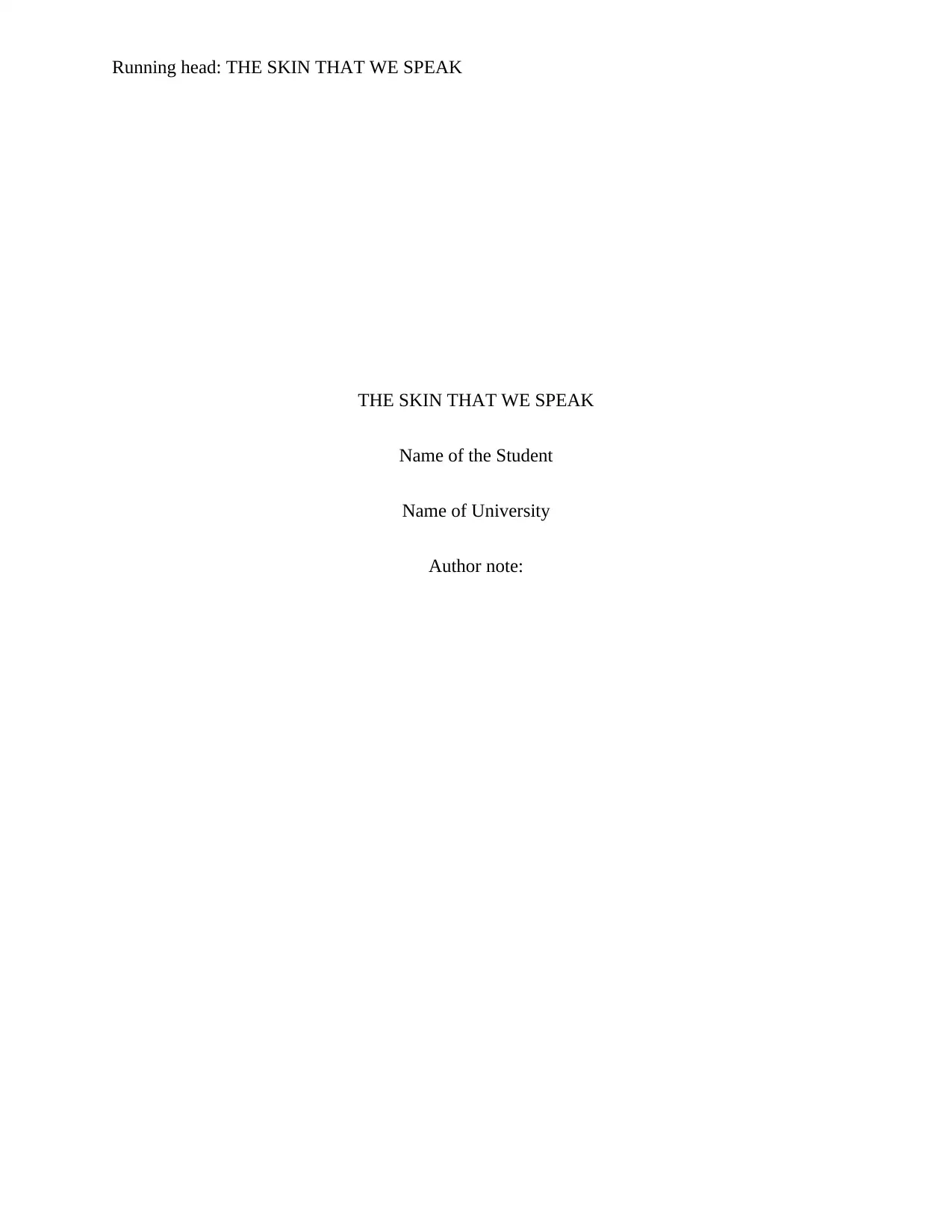
Running head: THE SKIN THAT WE SPEAK
THE SKIN THAT WE SPEAK
Name of the Student
Name of University
Author note:
THE SKIN THAT WE SPEAK
Name of the Student
Name of University
Author note:
Secure Best Marks with AI Grader
Need help grading? Try our AI Grader for instant feedback on your assignments.
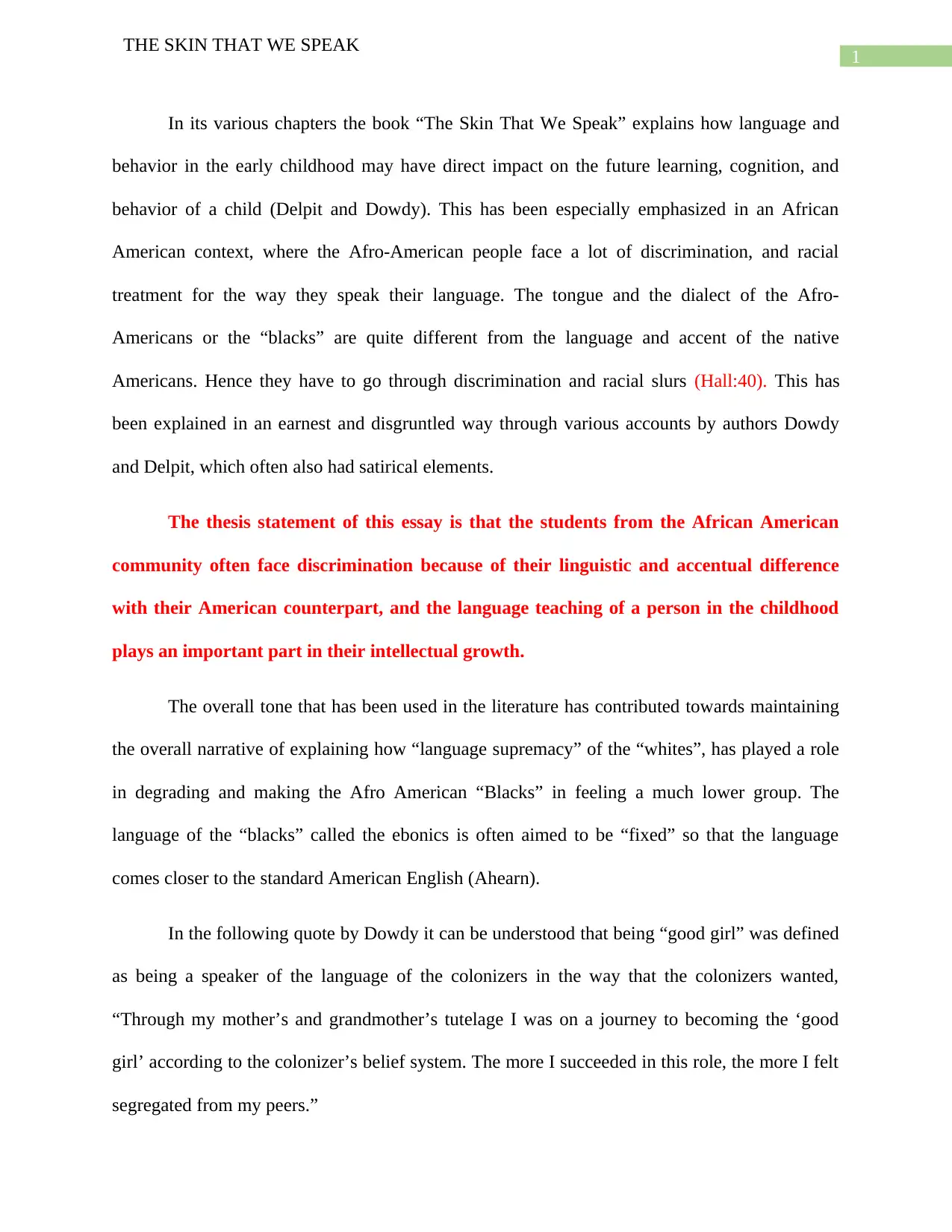
1
THE SKIN THAT WE SPEAK
In its various chapters the book “The Skin That We Speak” explains how language and
behavior in the early childhood may have direct impact on the future learning, cognition, and
behavior of a child (Delpit and Dowdy). This has been especially emphasized in an African
American context, where the Afro-American people face a lot of discrimination, and racial
treatment for the way they speak their language. The tongue and the dialect of the Afro-
Americans or the “blacks” are quite different from the language and accent of the native
Americans. Hence they have to go through discrimination and racial slurs (Hall:40). This has
been explained in an earnest and disgruntled way through various accounts by authors Dowdy
and Delpit, which often also had satirical elements.
The thesis statement of this essay is that the students from the African American
community often face discrimination because of their linguistic and accentual difference
with their American counterpart, and the language teaching of a person in the childhood
plays an important part in their intellectual growth.
The overall tone that has been used in the literature has contributed towards maintaining
the overall narrative of explaining how “language supremacy” of the “whites”, has played a role
in degrading and making the Afro American “Blacks” in feeling a much lower group. The
language of the “blacks” called the ebonics is often aimed to be “fixed” so that the language
comes closer to the standard American English (Ahearn).
In the following quote by Dowdy it can be understood that being “good girl” was defined
as being a speaker of the language of the colonizers in the way that the colonizers wanted,
“Through my mother’s and grandmother’s tutelage I was on a journey to becoming the ‘good
girl’ according to the colonizer’s belief system. The more I succeeded in this role, the more I felt
segregated from my peers.”
THE SKIN THAT WE SPEAK
In its various chapters the book “The Skin That We Speak” explains how language and
behavior in the early childhood may have direct impact on the future learning, cognition, and
behavior of a child (Delpit and Dowdy). This has been especially emphasized in an African
American context, where the Afro-American people face a lot of discrimination, and racial
treatment for the way they speak their language. The tongue and the dialect of the Afro-
Americans or the “blacks” are quite different from the language and accent of the native
Americans. Hence they have to go through discrimination and racial slurs (Hall:40). This has
been explained in an earnest and disgruntled way through various accounts by authors Dowdy
and Delpit, which often also had satirical elements.
The thesis statement of this essay is that the students from the African American
community often face discrimination because of their linguistic and accentual difference
with their American counterpart, and the language teaching of a person in the childhood
plays an important part in their intellectual growth.
The overall tone that has been used in the literature has contributed towards maintaining
the overall narrative of explaining how “language supremacy” of the “whites”, has played a role
in degrading and making the Afro American “Blacks” in feeling a much lower group. The
language of the “blacks” called the ebonics is often aimed to be “fixed” so that the language
comes closer to the standard American English (Ahearn).
In the following quote by Dowdy it can be understood that being “good girl” was defined
as being a speaker of the language of the colonizers in the way that the colonizers wanted,
“Through my mother’s and grandmother’s tutelage I was on a journey to becoming the ‘good
girl’ according to the colonizer’s belief system. The more I succeeded in this role, the more I felt
segregated from my peers.”
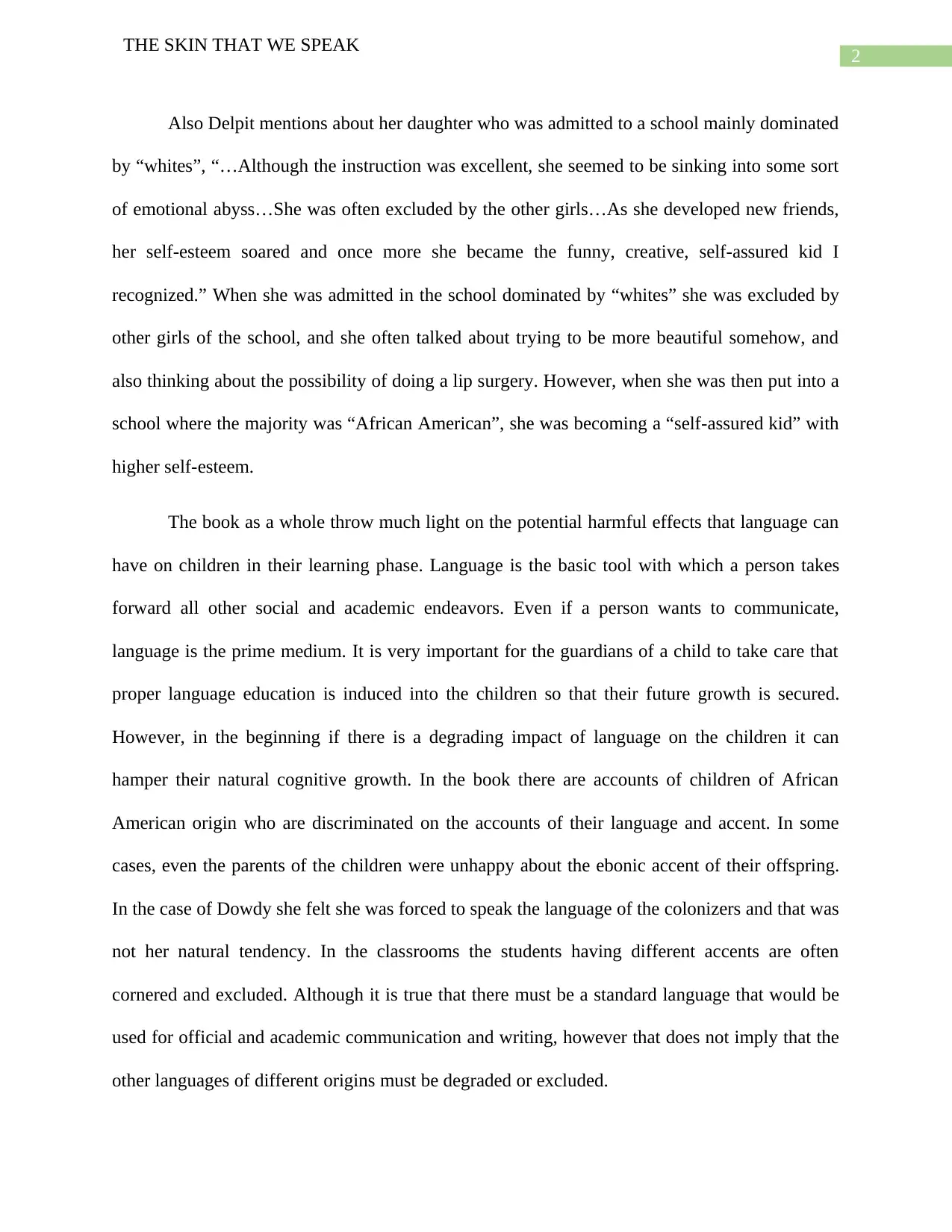
2
THE SKIN THAT WE SPEAK
Also Delpit mentions about her daughter who was admitted to a school mainly dominated
by “whites”, “…Although the instruction was excellent, she seemed to be sinking into some sort
of emotional abyss…She was often excluded by the other girls…As she developed new friends,
her self-esteem soared and once more she became the funny, creative, self-assured kid I
recognized.” When she was admitted in the school dominated by “whites” she was excluded by
other girls of the school, and she often talked about trying to be more beautiful somehow, and
also thinking about the possibility of doing a lip surgery. However, when she was then put into a
school where the majority was “African American”, she was becoming a “self-assured kid” with
higher self-esteem.
The book as a whole throw much light on the potential harmful effects that language can
have on children in their learning phase. Language is the basic tool with which a person takes
forward all other social and academic endeavors. Even if a person wants to communicate,
language is the prime medium. It is very important for the guardians of a child to take care that
proper language education is induced into the children so that their future growth is secured.
However, in the beginning if there is a degrading impact of language on the children it can
hamper their natural cognitive growth. In the book there are accounts of children of African
American origin who are discriminated on the accounts of their language and accent. In some
cases, even the parents of the children were unhappy about the ebonic accent of their offspring.
In the case of Dowdy she felt she was forced to speak the language of the colonizers and that was
not her natural tendency. In the classrooms the students having different accents are often
cornered and excluded. Although it is true that there must be a standard language that would be
used for official and academic communication and writing, however that does not imply that the
other languages of different origins must be degraded or excluded.
THE SKIN THAT WE SPEAK
Also Delpit mentions about her daughter who was admitted to a school mainly dominated
by “whites”, “…Although the instruction was excellent, she seemed to be sinking into some sort
of emotional abyss…She was often excluded by the other girls…As she developed new friends,
her self-esteem soared and once more she became the funny, creative, self-assured kid I
recognized.” When she was admitted in the school dominated by “whites” she was excluded by
other girls of the school, and she often talked about trying to be more beautiful somehow, and
also thinking about the possibility of doing a lip surgery. However, when she was then put into a
school where the majority was “African American”, she was becoming a “self-assured kid” with
higher self-esteem.
The book as a whole throw much light on the potential harmful effects that language can
have on children in their learning phase. Language is the basic tool with which a person takes
forward all other social and academic endeavors. Even if a person wants to communicate,
language is the prime medium. It is very important for the guardians of a child to take care that
proper language education is induced into the children so that their future growth is secured.
However, in the beginning if there is a degrading impact of language on the children it can
hamper their natural cognitive growth. In the book there are accounts of children of African
American origin who are discriminated on the accounts of their language and accent. In some
cases, even the parents of the children were unhappy about the ebonic accent of their offspring.
In the case of Dowdy she felt she was forced to speak the language of the colonizers and that was
not her natural tendency. In the classrooms the students having different accents are often
cornered and excluded. Although it is true that there must be a standard language that would be
used for official and academic communication and writing, however that does not imply that the
other languages of different origins must be degraded or excluded.
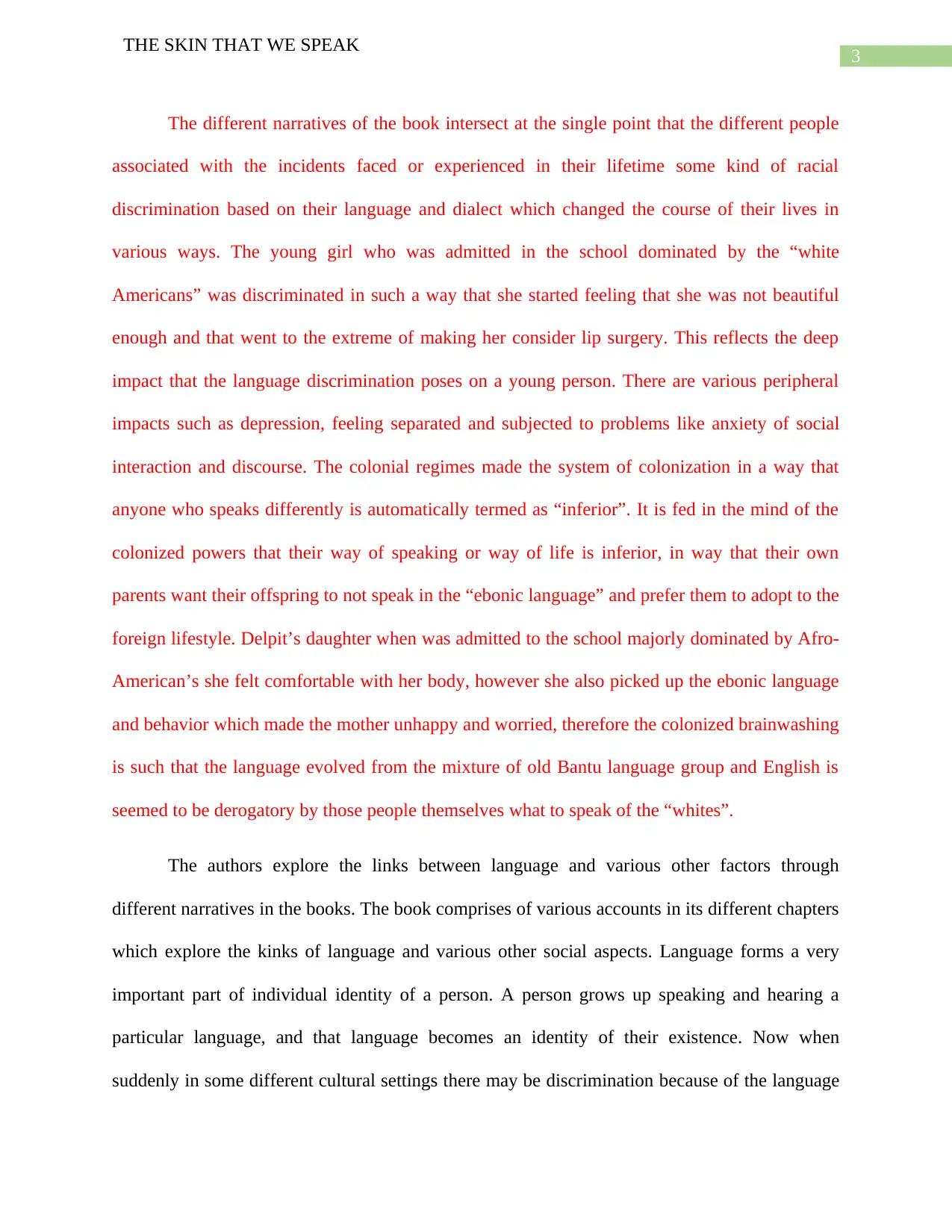
3
THE SKIN THAT WE SPEAK
The different narratives of the book intersect at the single point that the different people
associated with the incidents faced or experienced in their lifetime some kind of racial
discrimination based on their language and dialect which changed the course of their lives in
various ways. The young girl who was admitted in the school dominated by the “white
Americans” was discriminated in such a way that she started feeling that she was not beautiful
enough and that went to the extreme of making her consider lip surgery. This reflects the deep
impact that the language discrimination poses on a young person. There are various peripheral
impacts such as depression, feeling separated and subjected to problems like anxiety of social
interaction and discourse. The colonial regimes made the system of colonization in a way that
anyone who speaks differently is automatically termed as “inferior”. It is fed in the mind of the
colonized powers that their way of speaking or way of life is inferior, in way that their own
parents want their offspring to not speak in the “ebonic language” and prefer them to adopt to the
foreign lifestyle. Delpit’s daughter when was admitted to the school majorly dominated by Afro-
American’s she felt comfortable with her body, however she also picked up the ebonic language
and behavior which made the mother unhappy and worried, therefore the colonized brainwashing
is such that the language evolved from the mixture of old Bantu language group and English is
seemed to be derogatory by those people themselves what to speak of the “whites”.
The authors explore the links between language and various other factors through
different narratives in the books. The book comprises of various accounts in its different chapters
which explore the kinks of language and various other social aspects. Language forms a very
important part of individual identity of a person. A person grows up speaking and hearing a
particular language, and that language becomes an identity of their existence. Now when
suddenly in some different cultural settings there may be discrimination because of the language
THE SKIN THAT WE SPEAK
The different narratives of the book intersect at the single point that the different people
associated with the incidents faced or experienced in their lifetime some kind of racial
discrimination based on their language and dialect which changed the course of their lives in
various ways. The young girl who was admitted in the school dominated by the “white
Americans” was discriminated in such a way that she started feeling that she was not beautiful
enough and that went to the extreme of making her consider lip surgery. This reflects the deep
impact that the language discrimination poses on a young person. There are various peripheral
impacts such as depression, feeling separated and subjected to problems like anxiety of social
interaction and discourse. The colonial regimes made the system of colonization in a way that
anyone who speaks differently is automatically termed as “inferior”. It is fed in the mind of the
colonized powers that their way of speaking or way of life is inferior, in way that their own
parents want their offspring to not speak in the “ebonic language” and prefer them to adopt to the
foreign lifestyle. Delpit’s daughter when was admitted to the school majorly dominated by Afro-
American’s she felt comfortable with her body, however she also picked up the ebonic language
and behavior which made the mother unhappy and worried, therefore the colonized brainwashing
is such that the language evolved from the mixture of old Bantu language group and English is
seemed to be derogatory by those people themselves what to speak of the “whites”.
The authors explore the links between language and various other factors through
different narratives in the books. The book comprises of various accounts in its different chapters
which explore the kinks of language and various other social aspects. Language forms a very
important part of individual identity of a person. A person grows up speaking and hearing a
particular language, and that language becomes an identity of their existence. Now when
suddenly in some different cultural settings there may be discrimination because of the language
Secure Best Marks with AI Grader
Need help grading? Try our AI Grader for instant feedback on your assignments.
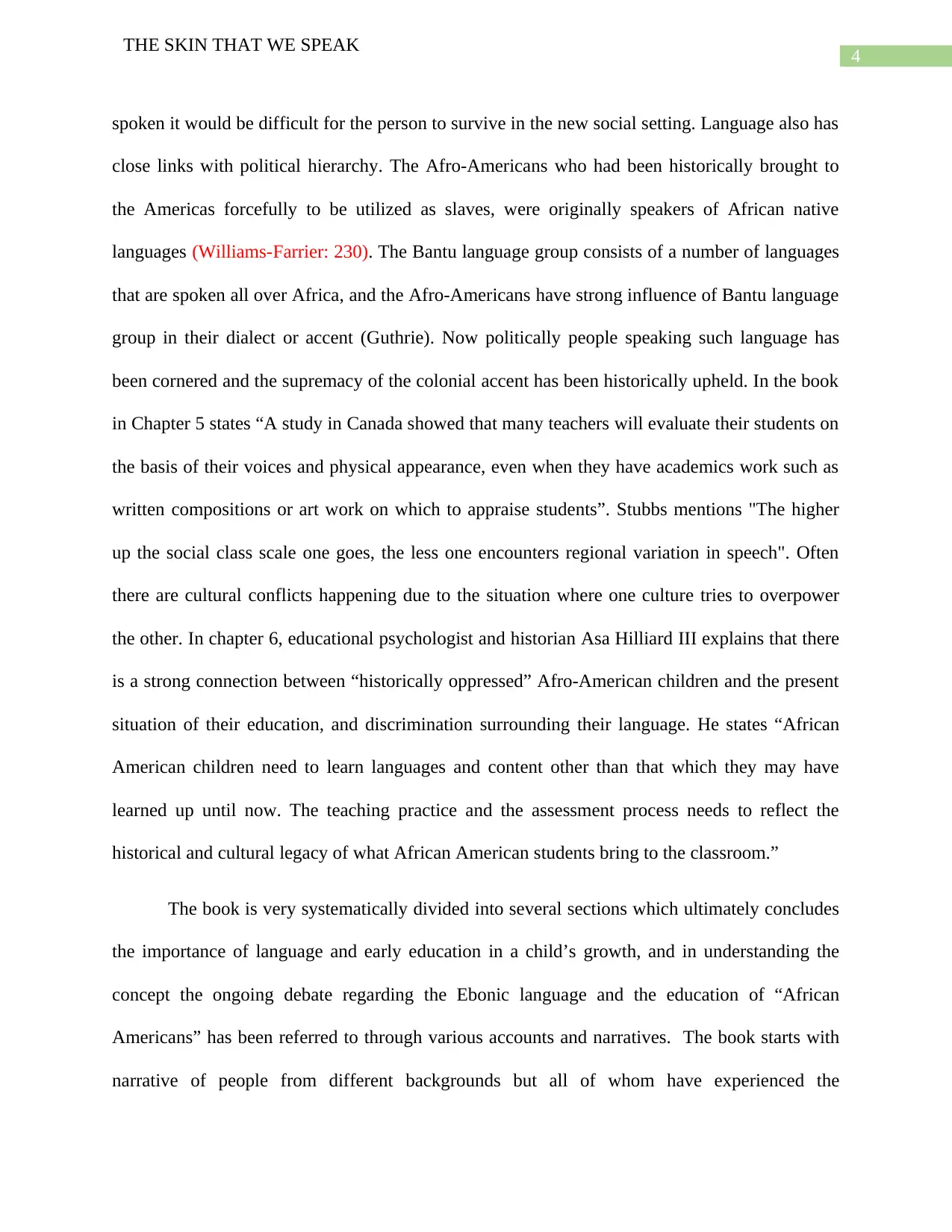
4
THE SKIN THAT WE SPEAK
spoken it would be difficult for the person to survive in the new social setting. Language also has
close links with political hierarchy. The Afro-Americans who had been historically brought to
the Americas forcefully to be utilized as slaves, were originally speakers of African native
languages (Williams-Farrier: 230). The Bantu language group consists of a number of languages
that are spoken all over Africa, and the Afro-Americans have strong influence of Bantu language
group in their dialect or accent (Guthrie). Now politically people speaking such language has
been cornered and the supremacy of the colonial accent has been historically upheld. In the book
in Chapter 5 states “A study in Canada showed that many teachers will evaluate their students on
the basis of their voices and physical appearance, even when they have academics work such as
written compositions or art work on which to appraise students”. Stubbs mentions "The higher
up the social class scale one goes, the less one encounters regional variation in speech". Often
there are cultural conflicts happening due to the situation where one culture tries to overpower
the other. In chapter 6, educational psychologist and historian Asa Hilliard III explains that there
is a strong connection between “historically oppressed” Afro-American children and the present
situation of their education, and discrimination surrounding their language. He states “African
American children need to learn languages and content other than that which they may have
learned up until now. The teaching practice and the assessment process needs to reflect the
historical and cultural legacy of what African American students bring to the classroom.”
The book is very systematically divided into several sections which ultimately concludes
the importance of language and early education in a child’s growth, and in understanding the
concept the ongoing debate regarding the Ebonic language and the education of “African
Americans” has been referred to through various accounts and narratives. The book starts with
narrative of people from different backgrounds but all of whom have experienced the
THE SKIN THAT WE SPEAK
spoken it would be difficult for the person to survive in the new social setting. Language also has
close links with political hierarchy. The Afro-Americans who had been historically brought to
the Americas forcefully to be utilized as slaves, were originally speakers of African native
languages (Williams-Farrier: 230). The Bantu language group consists of a number of languages
that are spoken all over Africa, and the Afro-Americans have strong influence of Bantu language
group in their dialect or accent (Guthrie). Now politically people speaking such language has
been cornered and the supremacy of the colonial accent has been historically upheld. In the book
in Chapter 5 states “A study in Canada showed that many teachers will evaluate their students on
the basis of their voices and physical appearance, even when they have academics work such as
written compositions or art work on which to appraise students”. Stubbs mentions "The higher
up the social class scale one goes, the less one encounters regional variation in speech". Often
there are cultural conflicts happening due to the situation where one culture tries to overpower
the other. In chapter 6, educational psychologist and historian Asa Hilliard III explains that there
is a strong connection between “historically oppressed” Afro-American children and the present
situation of their education, and discrimination surrounding their language. He states “African
American children need to learn languages and content other than that which they may have
learned up until now. The teaching practice and the assessment process needs to reflect the
historical and cultural legacy of what African American students bring to the classroom.”
The book is very systematically divided into several sections which ultimately concludes
the importance of language and early education in a child’s growth, and in understanding the
concept the ongoing debate regarding the Ebonic language and the education of “African
Americans” has been referred to through various accounts and narratives. The book starts with
narrative of people from different backgrounds but all of whom have experienced the
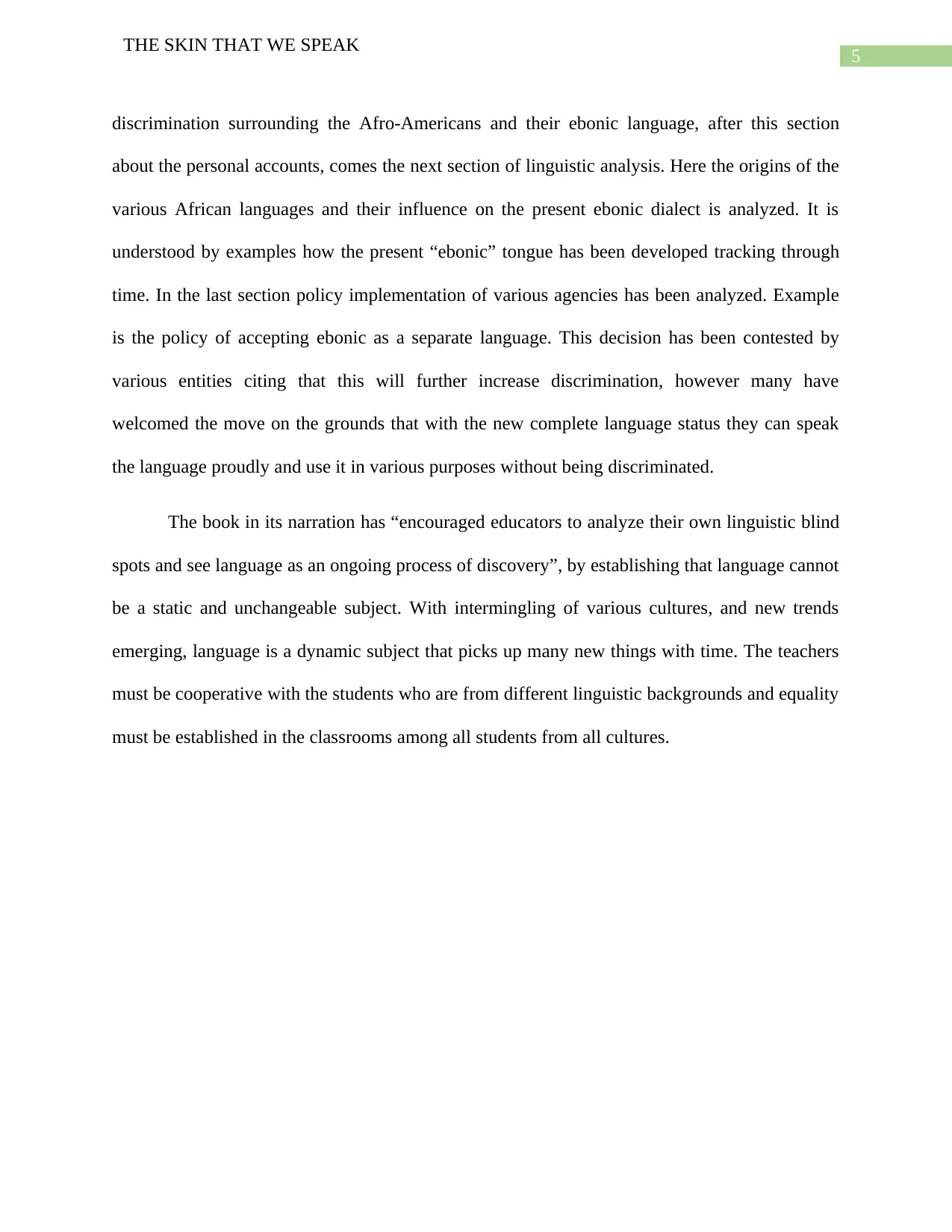
5
THE SKIN THAT WE SPEAK
discrimination surrounding the Afro-Americans and their ebonic language, after this section
about the personal accounts, comes the next section of linguistic analysis. Here the origins of the
various African languages and their influence on the present ebonic dialect is analyzed. It is
understood by examples how the present “ebonic” tongue has been developed tracking through
time. In the last section policy implementation of various agencies has been analyzed. Example
is the policy of accepting ebonic as a separate language. This decision has been contested by
various entities citing that this will further increase discrimination, however many have
welcomed the move on the grounds that with the new complete language status they can speak
the language proudly and use it in various purposes without being discriminated.
The book in its narration has “encouraged educators to analyze their own linguistic blind
spots and see language as an ongoing process of discovery”, by establishing that language cannot
be a static and unchangeable subject. With intermingling of various cultures, and new trends
emerging, language is a dynamic subject that picks up many new things with time. The teachers
must be cooperative with the students who are from different linguistic backgrounds and equality
must be established in the classrooms among all students from all cultures.
THE SKIN THAT WE SPEAK
discrimination surrounding the Afro-Americans and their ebonic language, after this section
about the personal accounts, comes the next section of linguistic analysis. Here the origins of the
various African languages and their influence on the present ebonic dialect is analyzed. It is
understood by examples how the present “ebonic” tongue has been developed tracking through
time. In the last section policy implementation of various agencies has been analyzed. Example
is the policy of accepting ebonic as a separate language. This decision has been contested by
various entities citing that this will further increase discrimination, however many have
welcomed the move on the grounds that with the new complete language status they can speak
the language proudly and use it in various purposes without being discriminated.
The book in its narration has “encouraged educators to analyze their own linguistic blind
spots and see language as an ongoing process of discovery”, by establishing that language cannot
be a static and unchangeable subject. With intermingling of various cultures, and new trends
emerging, language is a dynamic subject that picks up many new things with time. The teachers
must be cooperative with the students who are from different linguistic backgrounds and equality
must be established in the classrooms among all students from all cultures.
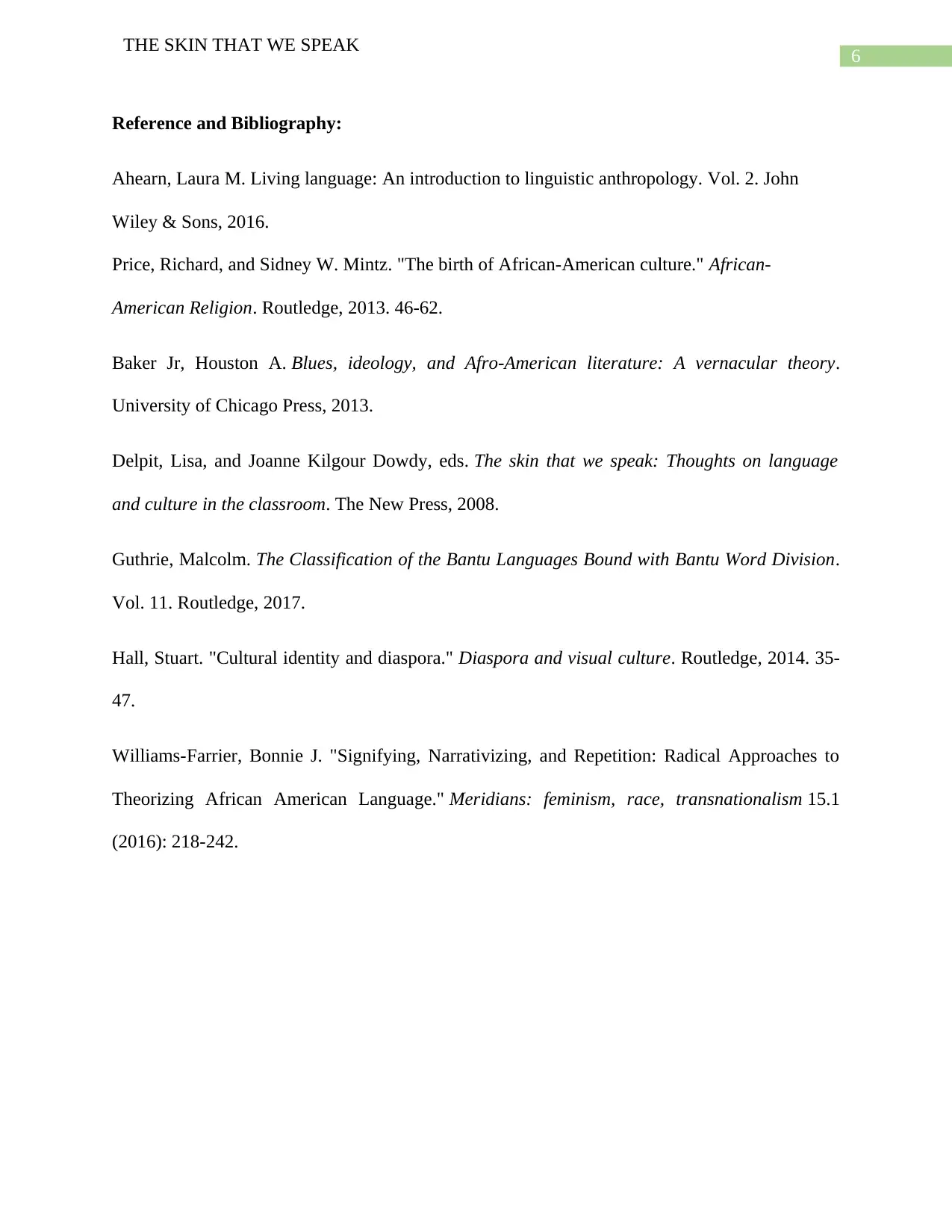
6
THE SKIN THAT WE SPEAK
Reference and Bibliography:
Ahearn, Laura M. Living language: An introduction to linguistic anthropology. Vol. 2. John
Wiley & Sons, 2016.
Price, Richard, and Sidney W. Mintz. "The birth of African-American culture." African-
American Religion. Routledge, 2013. 46-62.
Baker Jr, Houston A. Blues, ideology, and Afro-American literature: A vernacular theory.
University of Chicago Press, 2013.
Delpit, Lisa, and Joanne Kilgour Dowdy, eds. The skin that we speak: Thoughts on language
and culture in the classroom. The New Press, 2008.
Guthrie, Malcolm. The Classification of the Bantu Languages Bound with Bantu Word Division.
Vol. 11. Routledge, 2017.
Hall, Stuart. "Cultural identity and diaspora." Diaspora and visual culture. Routledge, 2014. 35-
47.
Williams-Farrier, Bonnie J. "Signifying, Narrativizing, and Repetition: Radical Approaches to
Theorizing African American Language." Meridians: feminism, race, transnationalism 15.1
(2016): 218-242.
THE SKIN THAT WE SPEAK
Reference and Bibliography:
Ahearn, Laura M. Living language: An introduction to linguistic anthropology. Vol. 2. John
Wiley & Sons, 2016.
Price, Richard, and Sidney W. Mintz. "The birth of African-American culture." African-
American Religion. Routledge, 2013. 46-62.
Baker Jr, Houston A. Blues, ideology, and Afro-American literature: A vernacular theory.
University of Chicago Press, 2013.
Delpit, Lisa, and Joanne Kilgour Dowdy, eds. The skin that we speak: Thoughts on language
and culture in the classroom. The New Press, 2008.
Guthrie, Malcolm. The Classification of the Bantu Languages Bound with Bantu Word Division.
Vol. 11. Routledge, 2017.
Hall, Stuart. "Cultural identity and diaspora." Diaspora and visual culture. Routledge, 2014. 35-
47.
Williams-Farrier, Bonnie J. "Signifying, Narrativizing, and Repetition: Radical Approaches to
Theorizing African American Language." Meridians: feminism, race, transnationalism 15.1
(2016): 218-242.
1 out of 7
Your All-in-One AI-Powered Toolkit for Academic Success.
+13062052269
info@desklib.com
Available 24*7 on WhatsApp / Email
![[object Object]](/_next/static/media/star-bottom.7253800d.svg)
Unlock your academic potential
© 2024 | Zucol Services PVT LTD | All rights reserved.
